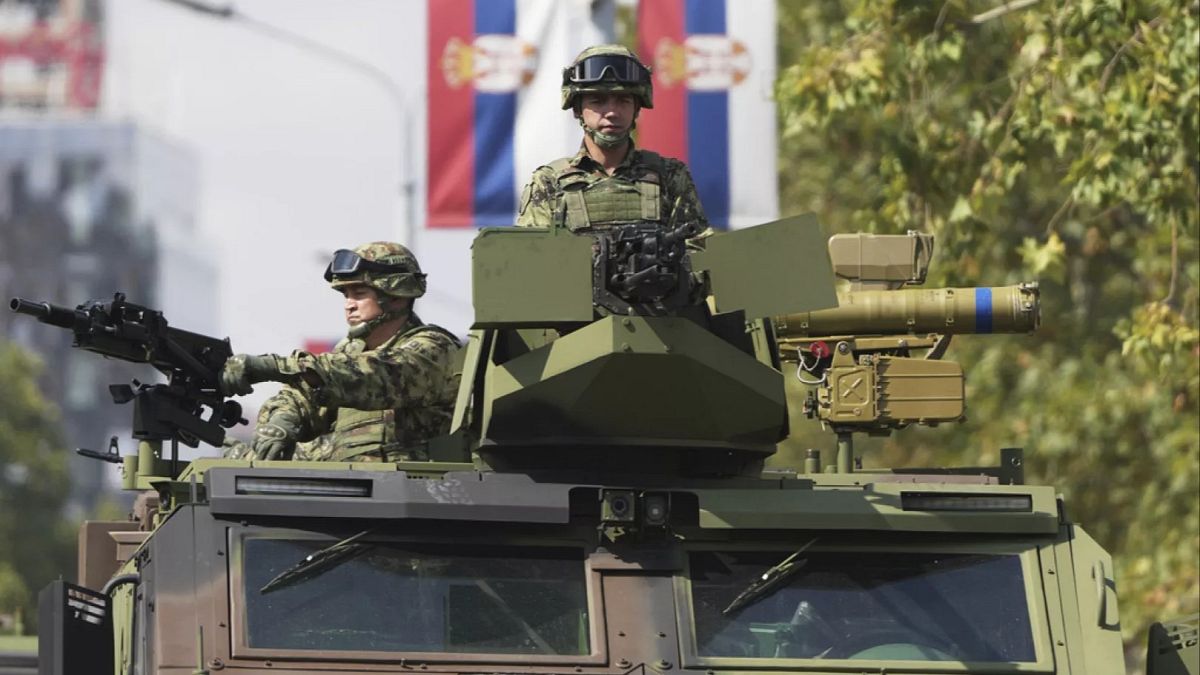ADVERTISEMENT
Serbia will showcase 19 new weapon systems at Saturday’s military parade, in a display of the Western Balkan nation’s multi-pronged foreign policy balancing EU aspirations with arms deals spanning France, China, Israel and Russia.
Officials in Belgrade describe the diversified military procurement as part of the country’s aspiration to neutrality. For analysts, however, the approach shows that strategic priorities are just as crucial as nominal non-alignment.
According to Serbian independent geopolitical and defence analyst Nikola Lunić, it is certainly not a message of strength.
“Deterrence is not needed since our geographical position is surrounded by NATO and the European Union,” Lunić told Euronews.
“Formally, Serbia’s orientation is towards the EU integration, even though currently, its real foreign policy focus is not clear yet,” Lunić added.
While awaiting to join the EU, and without a NATO accession perspective, Serbia aspires to a de facto neutrality, partly as a result of its recent history following the violent breakup of Yugoslavia in the 1990s.
According to Gordan Akrap, a security advisor of the Croatian government, the memory of NATO bombing against Serbia in 1999 amid the conflict in Kosovo still represents a significant obstacle to Belgrade’s path towards the alliance.
“It’s very hard to have in mind that Serbia in the near future is going to become a NATO ally, not just because they don’t want it, but there are quite a lot of things that Serbia needs to fulfil in order to apply for NATO membership,” Akrap said.
Regardless of its relations with the security alliance, Serbia is clearly set on its path of joining the EU, according to Ana Brnabić, speaker of the Serbian parliament.
“We know that our strategic priority as a country is the integration into the EU and I do not see this as a competing interest,” Brnabić told Euronews.
Serbia needs time, according to Brnabić, who previously also served as the country’s prime minister.
“If you look at the EU integration, it is clear that any accession country should gradually align it security and foreign policy with the EU; these are the rules of the game,” she said.
On 3 September, Serbian President Aleksandar Vučić attended the military parade in Beijing marking the 80th anniversary of China’s victory over Japan in World War II, alongside Slovak Prime Minister Robert Fico, the only head of government from an EU and NATO member state in attendance.
But does this mean Belgrade is stepping away from Brussels?
“I don’t think so. Especially considering the People’s Republic of China, the EU highest officials also visited Beijing,” said Brnabić. “The president of China, Xi, visited some of the EU capitals. It’s not something where ones has to choose either or,” she explained.
Diversifying arsenal suppliers
Meanwhile, Serbia has worked hard to diversify its substantially renewed military arsenal.
Belgrade remains one of a handful of European countries that did not impose sanctions against Russia, from which it has purchased weapons in the past. At the same time, it pledged humanitarian aid to Ukraine and has been accused repeatedly by Moscow of providing Kyiv with materiel, prompting Serbia to put all arms exports on pause.
Serbia also purchased Rafale multi-role fighter jets from France and anti-aircraft missile systems from China, among several arms deals with different suppliers in recent years.
Diversifying the arms purchases from different countries could generate problems of technical compatibility among weapon systems within the same army, experts believe.
On the other hand, sometimes arms acquisitions from different sellers and different sources are done as a diplomatic “gesture of good political will towards” the exporting country, said Akrap.
It was made public last August that Serbia concluded a technical and commercial cooperation agreement for the value of over €1 billion with the Israeli high-tech company Elbit for the purchase of Hermes 900 drones.
“We have to produce and import not only systems, but technology. And this is important. The contract with Elbit is also about importing sophisticated technologies from Israel,” Lunić said.
Serbian authorities have announced that in addition to the 19 new weapon systems on display at Saturday’s parade, two Rafales from the French Air Force will be patrolling the skies over Belgrade, as Serbia awaits its own French jet delivery.
